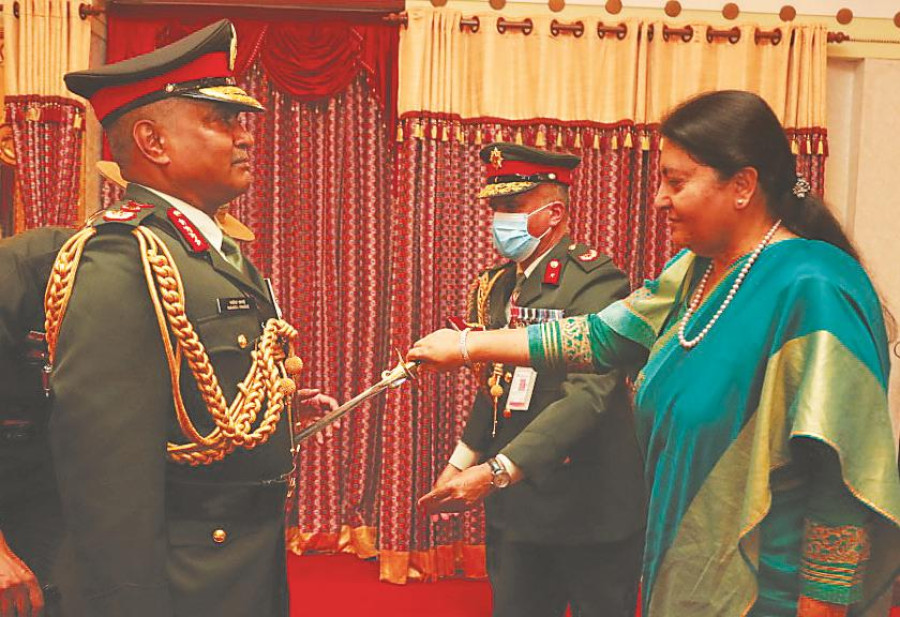National
Nepal refuses to be pushed into a hasty decision on Indian’s Agnipath scheme
Ministry says government formed after November polls will take a call on if Nepalis can join Indian Army’s plan.
Purushottam Poudel
After the Indian Army chief General Manoj Pande on Wednesday hinted of India’s withdrawal of vacancies enlisted for Nepalis under the new Agnipath scheme, Nepal’s Ministry for Foreign Affairs on Thursday conveyed that the country is unlikely to take any decision on the issue before the November 20 elections.
Speaking at a regular press briefing on Thursday, ministry spokesperson Sewa Lamsal said Nepal will not pursue the matter further right now.
“This issue will be entertained only after the elections,” said Lamsal. “No talks or dialogues will be initiated immediately. The Nepal government has made its position clear, we will decide on it after the general and provincial polls.”
Earlier, replying to a question at a session in the United Service Institute of India on Wednesday, General Pande had said that the vacancies allocated to Nepali Gorkhas will have to be ‘redistributed’ to others for the time being if Kathmandu does not allow recruitment as per the laid-down cut-off dates.
“In my opinion, I do not think Nepal will take any decision about Agnipath before the general elections on November 20,” General Pande said. “Especially given that some quarters are opposed to the Indian Army recruiting Nepali youths.”
Many espied a hint of impatience–even irritation–in the Indian army chief’s comment at Nepal’s failure to come to a quick decision.
However, security experts in Nepal argue that the Indian Army chief’s statement is natural. As India launched the Agnipath scheme without consulting Nepal, they reckon, it is in breach of the 1947 tripartite agreement between India, Britain and Nepal. Therefore India deciding to redistribute the scheme seats should be taken as natural.
“The Agnipath scheme is not in favour of Nepali youths,” Retired Major General of Nepal Army Purna Bahadur Silwal told the Post. “Recruitment of Nepalis in the Indian Army should be based on the tripartite agreement. So if India decides to recruit other groups under the new Agnipath scheme, which is not in line with the agreement, then it should be taken as something normal.”
The Indians can decide on this scheme on their own as it is not meant for Nepalis, Silwal added.
Nepal has been in communication with India through multiple channels over the recruitment of Nepali youths under the Agnipath scheme, while stressing that any recruitment must be in line with the 1947 agreement, according to officials.
Foreign Secretary Bharat Raj Poudyal met his Indian counterpart, Vinay Mohan Kwatra, on Tuesday to discuss bilateral issues. On Wednesday, he held talks with Indian External Affairs Minister S Jaishankar. But there was no mention of the Agnipath scheme in the statements issued by either country.
Many believe Nepal should not allow India to recruit Nepali youths under the Agnipath scheme. According to the Indian government's proposal, 75 percent of youths recruited under the scheme will retire after four years of service and receive a lump sum of INR 1.7 million under the "Sewa Nidhi Package." That is Nepal's primary concern, said Silwal.
“What would the Nepali youths do after their retirement from the Indian army after only four years?” Silwal asked. “There is a good chance of them straying onto wrong paths.”
However, Indian experts on Nepal see the issue differently. They say Nepal government’s decision to postpone the recruitments at least until November elections has only added to uncertainties.
“Nepal should have done one of the two things,” former Indian ambassador to Nepal Ranjit Rae told the Post. “It should either have withheld recruitment under the Agnipath scheme for some time, or allowed recruitment now while leaving the new government to be elected through the November elections to take a formal decision on the matter.”
When Nepal does not make a definitive decision, the Indian Army will have to look elsewhere to fulfil the required quota, said Rae.




 9.83°C Kathmandu
9.83°C Kathmandu














